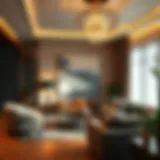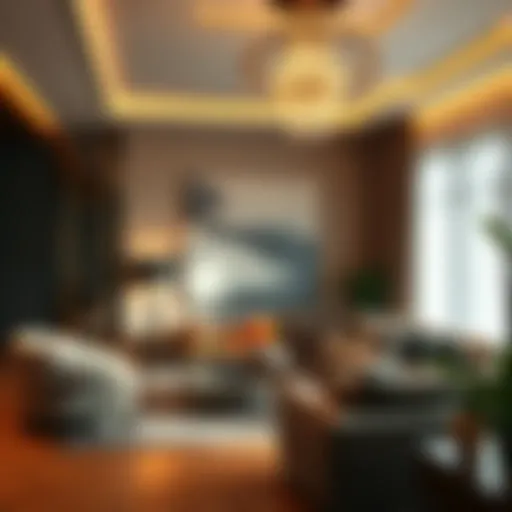Eid ul-Adha 2023 Prayer Timing in Dubai
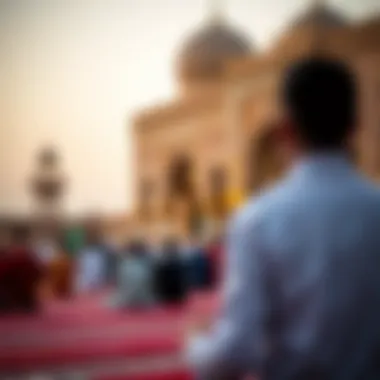

Intro
Eid ul-Adha, commonly known as the "Festival of Sacrifice," holds immense significance within the Islamic calendar, celebrated by millions around the globe. In 2023, this auspicious occasion invites an even more vibrant tapestry of traditions and community spirit, particularly in Dubai. As the city grows and the community flourishes, this event brings together expatriates and locals alike, creating a sense of unity and mutual respect, beyond mere differences in traditions.
The ability to partake in communal prayers, engage in cultural events, and share the joy of the season is what truly exemplifies the essence of Eid ul-Adha in Dubai. As the sun rises on the day of celebration, the call to prayer echoes through the bustling streets, signaling the start of a day filled with worship, reflection, and communal bonding. This article aims to navigate through the various layers of the occasion, shedding light on the 2023 prayer times and the unique aspects surrounding them.
In addition, we'll explore how expatriates can navigate this festive time in Dubai, ensuring a smooth and enjoyable experience. From understanding the neighborhood dynamics to participating in local events, it all contributes to the larger narrative of life in this vibrant metropolis. With this overview, we invoke a more profound appreciation for the day and its implications for everyone involved.
Understanding Eid ul-Adha
Eid ul-Adha, often hailed as the "Festival of Sacrifice," holds a profound place in the hearts of Muslims around the globe. This celebration commemorates the willingness of Prophet Ibrahim (Abraham) to sacrifice his son Isma'il in obedience to God's command. This historical moment is not just about a sacrifice; it encapsulates themes of faith, devotion, and charity, resonating deeply within Islamic teachings. Understanding the layers of this festival is crucial as it lays the groundwork for participation in its prayers, rituals, and accompanying festivities.
Historical Background
The roots of Eid ul-Adha stretch back over a millennia, emerging within the Quranic narrative. Every year, millions of Muslims gather to express gratitude and reaffirm their faith through this festivity. The significance can also be traced back to the pilgrimage of Hajj, which occurs at the same time as this holiday. For many, participating in Eid ul-Adha is a reminder of shared history, reinforcing the collective identity of the Muslim community worldwide.
The historical essence of this festival also brings forth the memory of Hajj's rituals, connecting attendees to the practices of Ibrahim and Isma'il. This shared history makes Eid ul-Adha not just a day of celebration but also an introspective journey, revealing insights into personal faith and communal ties.
Religious Significance
Religiously, Eid ul-Adha embodies the spirit of selflessness and generosity. The act of Qurbani, or sacrifice, serves as a physical representation of this spirit. It's not just about the ritual act of sacrifice but also about sharing the blessings derived from it with those who are less fortunate. Families typically divide the meat into three parts: one-third for themselves, one-third for relatives, and one-third for those in need.
"The value of Eid ul-Adha lies not only in the communal celebration but in the act of giving and the reaffirmation of faith."
Moreover, this celebration solidifies bonds within the community, fostering a culture of mutual support and kindness. As individuals partake in the prayers together, dressed in new attire, sharing meals, and giving to charity, they contribute to a vibrant expression of communal harmony.
Recognizing these dimensions of Eid ul-Adha fosters a deeper appreciation for its practices, encouraging a genuine engagement with the day as its culturally rich facets unfold. Understanding this holiday fully paves the way for meaningful participation during the prayers and celebrations, particularly in vibrant cities like Dubai where such observances are a melting pot of traditions.
Eid ul-Adha Prayer in Dubai
When it comes to the celebration of Eid ul-Adha, the prayer marks one of the most significant moments of the day. In Dubai, this unique occasion resonates deeply within both the Muslim and multicultural communities, making it a pivotal point of gathering and spiritual reflection. Understanding the framework around the Eid ul-Adha prayer not only strengthens personal faith but also enhances community bonds.
Timing of Prayers
Timing plays a crucial role in the Eid ul-Adha prayers, which are held in the morning, usually after sunrise until just before the sun reaches its zenith. In Dubai, this range typically falls around 6:00 AM to 8:00 AM. It is imperative to be mindful of the exact timings as they can slightly vary each year.
Attending the prayer service at the right time ensures a shared experience where families and friends come together in unity. Therefore, individuals are advised to check local announcements or mosque schedules as the day approaches, ensuring the observance is both timely and respectful.
Location of Prayer Grounds
Eid prayers in Dubai are held at various locations, including grandeur mosques and expansive outdoor arenas, each offering its own unique atmosphere and communal vibe.
Major Mosques
Major mosques like the Grand Mosque and the Sheikh Zayed Mosque serve as vital centers for these prayers, attracting large crowds due to their capacity and spiritual significance. These mosques not only provide a structured setting for prayers but also enhance the sense of community among worshippers.
One key characteristic of major mosques is their architectural splendor and ample space, accommodating thousands of attendees. This feature often creates an uplifting atmosphere, filled with the spirit of togetherness. The Grand Mosque, for instance, is famed for its intricate detail and serene space, making it an ideal choice for many. However, it can get overcrowded, requiring early arrivals to secure a spot. The large congregation ensures a profound spiritual experience, mingled with rich cultural expressions.
Outdoor Prayer Areas
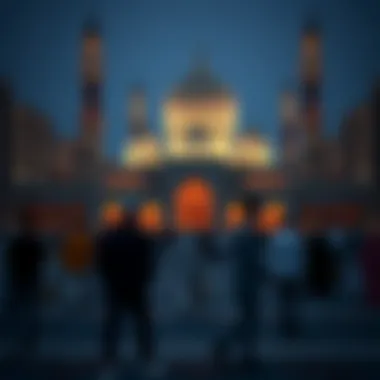

On the flip side, outdoor prayer areas across Dubai also play a significant role during Eid. Locations like Zabeel Park and Dubai's Expo Site become temporary prayer grounds catering to the masses. They offer a more relaxed environment where families can gather, often enhancing the festive spirit that envelops the day.
Outdoor spaces provide a refreshing experience with the open air and ample room for families to spread out, creating a sense of freedom and joy. However, one must consider potential challenges like weather constraints – heat can become an issue later in the day. Hence, early morning prayers often generate a more favorable atmosphere for attendees.
In both major mosques and outdoor areas, the deep sense of community and the shared experience of prayer helps reinforce the values of solidarity and thankfulness at the heart of Eid ul-Adha. As the time rolls around, participants can expect emotions to run high, where the prayers become not just a ritual but a celebration of faith and unity among locals and expatriates alike.
Eid ul-Adha Prayer Schedule for
The Eid ul-Adha Prayer Schedule for 2023 holds significant importance for the Muslim community in Dubai and beyond. This section addresses the essential elements surrounding the prayer timings, emphasizing how they contribute to the spirit and observance of this sacred festival.
Understanding the official prayer times is vital because it allows attendees to plan their day accordingly, ensuring they do not miss the communal prayers that mark the festive occasion. Since Eid ul-Adha is rooted in deep spiritual meaning, the collective act of prayer resonates in unison among worshippers. Having clarity on the timings fosters a sense of community engagement, contributing to a vibrant atmosphere during the celebrations.
Official Timing Announcements
For the year 2023, the official prayer time for Eid ul-Adha in Dubai will commence around 6:00 AM, but it’s best to check local announcements for the exact timings which may slightly vary based on the moon sighting. The Ministry of Islamic Affairs typically releases these timings a few days before Eid to help the community prepare. As ⏳ Eid ul-Adha approaches, many mosques and community centers also post updates on social media platforms like Facebook and community groups on Reddit to keep everyone informed.
"Following the official announcements is crucial for ensuring that everyone can participate in this significant spiritual event together."
Duration and Number of Services
Eid prayers are generally brief yet profound, typically lasting around 30 to 45 minutes. In Dubai, most large mosques, including the Grand Mosque, accommodate thousands of worshippers, hosting multiple services to cater to the influx of attendees. It’s common for there to be two or sometimes even three prayer services on Eid morning.
Here are a few practical insights regarding the number of services and their durations:
- First Service: 6:00 AM – this is typically the most attended.
- Second Service: 7:00 AM – provides a later option for those who can't make the first.
- Additional Services: Depending on crowd size, many mosques may offer a third service, sometimes around 8:00 AM.
Understanding these facets of the prayer schedule allows for a smoother Eid experience, ensuring that everyone from residents to expatriates can partake in the festivities of Eid ul-Adha with respect and joy.
Participating in the Eid Prayer
Participating in the Eid prayer holds a special place in the hearts of Muslims worldwide, especially in a multicultural city like Dubai. It is not merely a ritual; it is a profound expression of faith as well as a communal gathering that symbolizes unity among diverse groups. As such, understanding the nuances involved in this participation can significantly enhance the experience for both residents and expatriates.
The act of gathering for prayer fosters a sense of belonging and togetherness. Many residents look forward to this beautiful event, signifying the opportunity to strengthen community ties and celebrate shared beliefs. Engaging in the Eid prayer also serves as an important reminder of the spiritual significance of the holiday, allowing individuals to reflect on their devotion and connection to their faith.
Preparation for the Day
Clothing and Hygiene
On the day of Eid, dressing appropriately is a cornerstone of the festivities. The significance of clothing and hygiene goes beyond aesthetics; they reflect a person's respect for the occasion and their preparedness to engage with the community. Traditionally, many choose to wear new or their best clothes, symbolizing renewal and joy. In Dubai, where cultures blend, you can see a vibrant mix of attire ranging from traditional abayas and kanduras to modern outfits.
Key characteristic: The emphasis on cleanliness and neat attire is deeply rooted in Islamic teachings, making it a popular choice during Eid celebrations.
Unique feature: The choice of clothing often varies based on personal style and cultural background, which adds diversity and vibrancy to the prayer congregations across the city. Beyond mere looks, it conveys a message of joy to everyone present.
Spiritual Readiness
Beyond the physical preparation, spiritual readiness is crucial for anyone looking to fully engage in the Eid experience. This readiness involves introspection and an act of connecting with one’s faith. It often includes praying, reading the Quran, and seeking forgiveness ahead of the special day. Such practices help in aligning oneself spiritually, making the act of prayer more meaningful.
Key characteristic: Emphasizing spiritual readiness creates an atmosphere of solemnity and devotion, enhancing the significance of the prayer itself.
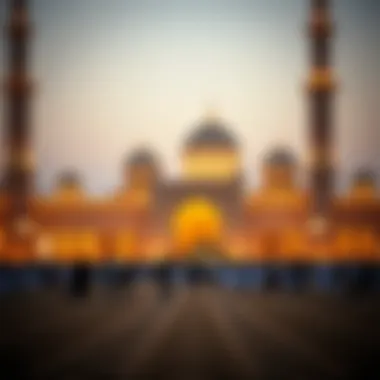

Unique feature: Often overlooked, this element is essential to enriching the Eid experience and establishing a deeper connection to the community and shared beliefs.
Expected Etiquette During the Prayer
Understanding expected etiquette during the prayer can enhance the communal experience.
- Arrive Early: It is customary to arrive early at the prayer grounds to ensure a good place to pray and to engage with fellow worshippers.
- Calm and Composed Behavior: Maintaining composure during prayer showcases respect for the occasion and those praying around you.
- Greeting Others: Offering friendly greetings is common in the community, creating an inclusive environment.
"Eid is not just a day of celebration; it's a moment that binds us in devotion, respect, and love for each other."
Being aware of these aspects not only improves the individual's experience but also enriches the community's shared journey through faith, ensuring that the spirit of Eid ul-Adha is felt by all.
Cultural Practices During Eid ul-Adha
Cultural practices during Eid ul-Adha highlight the essence of this significant celebration, particularly in diverse regions like Dubai. These customs not only reinforce Islamic teachings but also strengthen community ties and promote a spirit of generosity. Key activities during this time revolve around the concepts of sacrifice, sharing, and communal festivities, which serve to enhance the sense of belonging among worshippers regardless of their backgrounds.
Sacrifice and Share
Understanding Qurbani
The term Qurbani refers to the ritual sacrifice of livestock, an act steeped in symbolism and tradition. Central to Eid ul-Adha, it is an embodiment of devotion and a means of expressing gratitude toward Allah. Understanding Qurbani helps individuals grasp its layers of meaning. Interestingly, the animals chosen for sacrifice often include sheep, goats, and camels, chosen for health and quality, ensuring that the act is both respectful and meaningful.
This practice holds a distinctive place in the broader narrative of sacrifice, illustrating a commitment not just to faith, but to sharing one’s blessings with those in need.
Qurbani is widely considered a commendable choice as it emphasizes responsibility in caring for others. This act of sharing strengthens bonds within communities, reminding participants of those less fortunate, therefore aligning personal sacrifice with collective well-being. The unique feature of Qurbani is its ability to foster gratitude within communities. Participants often describe the emotional fulfillment derived from witnessing shared meals made possible by their sacrifices, reinforcing a sense of unity and support.
Charity and Community Focus
Charity plays an important role during Eid ul-Adha, reinforcing the communal spirit characteristic of the holiday. Focusing on charity not only broadens the impact of the celebration but also fosters a sense of accountability toward one another. For many, this aspect of Eid ul-Adha transforms a personal act into a communal story where everyone contributes to the welfare of others.
A significant advantage of fostering charity during this period is its ability to bridge gaps across socio-economic divides within the community. Unique initiatives, such as food drives and sharing of Qurbani meats, embody collective efforts to uplift those in need. These efforts not only aid families in challenging circumstances but also cultivate a stronger sense of identity and purpose among residents and expatriates alike.
In summary, through Qurbani and charitable initiatives, the cultural practices during Eid ul-Adha serve as vital pillars reinforcing community ties while also honoring Islamic principles. As various groups unite in celebration, these traditions demonstrate how the spirit of Eid ul-Adha can resonate through acts of kindness and sharing, intertwining the bonds of faith, culture, and humanity.
Festivities and Community Gatherings
Festivities and community gatherings usher in a vibrant atmosphere, characterized by colorful markets, shared meals, and engaging activities for all ages. The essence of these gatherings lies in their ability to foster connection and joy, breaking down barriers and encouraging inclusion among different cultures.
During Eid ul-Adha gatherings, one can observe lively exchanges and the sharing of home-cooked delicacies, which become central to the community experience. Events can range from local fairs to communal prayers, with a keen emphasis on togetherness, reflecting the very spirit of Eid.
"Celebration isn't just about the festivities; it's the connections we forge with one another that breathe life into the rituals we observe."
In Dubai, where diversity thrives, these celebrations tend to reflect a mosaic of various customs and traditions, blending both local and global elements seamlessly. For expatriates, participation in such gatherings fosters a sense of belonging while allowing for rich cultural exchanges that illuminate different perspectives, enhancing overall community cohesion.
Practical Considerations for Residents and Expatriates
When it comes to celebrating Eid ul-Adha, both residents and expatriates in Dubai face unique challenges and opportunities. Understanding these practical considerations is key to ensuring a smooth and fulfilling experience during this significant time. Proper planning can easily make the difference between a blissful day of celebration and a stressful one.
Navigating Transportation on Eid
Transportation during Eid ul-Adha can become a daunting task for anyone, but even more so in a bustling city like Dubai. With thousands of people heading to mosques and prayer grounds, the roads tend to get congested.
Here are a few tips to navigate through the bustling transport scene:
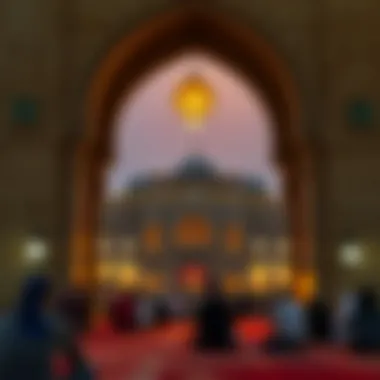

- Public Transport: Relying on public transport can be a sensible choice. Metro and buses often have extended hours on Eid, providing convenient access to major prayer locations. Knowing the routes and timings can save a lot of time and hassle.
- Ride-Sharing Services: Services such as Uber or Careem can be a hassle-free option, but surge pricing is common on holidays. Being prepared for potentially higher fares is vital.
- Personal Vehicles: If you choose to drive yourself, make sure to leave early. Traffic jams are almost a given as everyone is trying to reach the prayer grounds. Also, parking spaces can fill up fast, so having a backup plan is crucial.
Lastly, staying updated on traffic conditions via local news apps or traffic apps can also help in making informed decisions on the day.
Accommodations and Dining Options
For those who may not have a permanent residence in Dubai or those hosting friends and relatives, understanding accommodation and dining options for Eid ul-Adha adds another layer of convenience to the entire experience.
Here’s what to consider:
- Booking Accommodation Early: Hotels tend to fill up quickly during Eid. Travelers and even locals often seek staycations during this festive time, so reserving in advance is highly recommended, especially at popular locations like the Burj Khalifa or the waterfront area in Dubai Marina.
- Dining Choices: Eid ul-Adha also means special dining experiences. Many restaurants offer traditional dishes, and some even have special Eid menus. It's a good idea to either make reservations well ahead to secure your spot or check if restaurants provide takeout options to enjoy a family meal at home.
- Cultural Cuisine: Aside from the usual dining establishments, consider indulging in local favorites. Many food trucks and markets pop up during Eid, providing a chance to try authentic dishes while also supporting local businesses.
For further information regarding transportation options and dining establishments, check out local resources like Dubai Tourism or community boards on platforms like Reddit.
To ensure a memorable Eid ul-Adha, plan ahead and remain flexible to embrace the joy and community spirit of the occasion, no matter where you are in Dubai.
Eid ul-Adha in a Multicultural Context
Eid ul-Adha, also known as the Festival of Sacrifice, holds profound significance not just for Muslims, but also within the broader multicultural context of cities like Dubai. The vibrant blend of different cultures and religions in this Middle Eastern metropolis creates a unique backdrop for the celebration of this revered holiday. Understanding Eid in this context is crucial for building intercultural relationships and fostering respect among diverse communities.
The importance of this celebration transcends far beyond religious observance; it offers an opportunity for various cultural exchanges. People from different backgrounds come together, creating a tapestry of traditions that enrich the experience of Eid. For expatriates, particularly in a cosmopolitan locale such as Dubai, it’s a time to learn about the values of sacrifice, charity, and community engagement that are inherent in Eid ul-Adha.
"In a city where over 200 nationalities coexist, events surrounding Eid ul-Adha become a platform for showcasing diversity and unity alike."
Interfaith Observations
Interfaith observations during Eid ul-Adha play a pivotal role in promoting understanding and appreciation among various faiths. In Dubai, many Muslim and non-Muslim communities have developed friendships that extend beyond cultural boundaries. These interfaith gatherings often include
- Open prayer invitations: Non-Muslims are encouraged to attend prayers, offering them a glimpse into the rituals and significance of the occasion.
- Community dialogue: Many organizations host discussions and forums where individuals can learn about the values embodied during Eid, such as compassion and sharing.
- Cultural exhibitions: Events display traditional practices from different cultures, including culinary offerings from Asian, Middle Eastern, and Western traditions.
Through these initiatives, participants can foster respect for each other’s beliefs and values, while also celebrating the essence of Eid in a shared environment.
Community Engagement Initiatives
Community engagement initiatives during Eid ul-Adha further galvanize this spirit of unity. They emphasize the importance of giving back and supporting those in need, regardless of their background. A few notable initiatives include:
- Volunteering Opportunities: Residents can join hands with local NGOs and community groups to support the less fortunate. This might involve sharing meals, distributing Qurbani meat, or even helping organize local Eid events.
- Charity Drives: Many organizations use this time to run campaigns for food and clothing donations, encouraging everyone to participate, regardless of their faith or cultural background.
- Cultural Holiday Markets: Bazaar-style markets offering traditional foods, crafts, and educational workshops about various cultural practices surrounding Eid provide a fun and meaningful way to bring communities together.
In summary, as residents and visitors participate in Eid ul-Adha celebrations in Dubai, they also take part in a larger narrative of inclusiveness and community spirit. Through interfaith observations and community engagement, the day not only marks an important religious occasion but also strengthens the bonds between diverse groups. This enriching exchange ultimately demonstrates that while traditions may differ, the message of unity and compassion resonates universally.
Concluding Thoughts
As we wrap up our exploration into the profound holiday of Eid ul-Adha in Dubai, it becomes clear how significant this occasion is—not just for the act of prayer but for its deeply embedded customs that strengthen community ties. The prayers of Eid serve not only as a ritual for individuals to fulfill their religious duties but also as an essential fabric weaving together various threads of society.
Reflection on Eid's Importance
Eid ul-Adha signifies more than a celebration; it represents a momentous occasion that emphasizes compassion, generosity, and selflessness. It’s when families gather and communities come alive with joyous spirit, sharing meals, engaging in charity, and embracing traditions rooted in sacrifice. The act of Qurbani is a central aspect that reminds every individual of their gratitude towards life's blessings. In doing so, it fosters a sense of unity among the participants, making them feel connected to each other regardless of their backgrounds.
- Cultural Relevance: Eid ul-Adha cultivates a stronger social fabric, bridging gaps between various demographics in Dubai. As expatriates join in the festivity, they contribute to an enriched multicultural tapestry, thereby fostering respect and understanding between different backgrounds.
- Spiritual Growth: The occasion encourages reflection and personal growth. Engaging in prayer and charity helps individuals deepen their faith, cultivate a spirit of giving, and recognize their responsibilities towards their community.
Looking Ahead to Future Eid Celebrations
With each passing year, Eid ul-Adha presents an opportunity for renewal and revitalization of traditions. As we look toward future celebrations, a few key considerations emerge:
- Sustainability: As global consciousness shifts towards sustainability, future Eid celebrations in Dubai may adopt practices that prioritize environmental stewardship. From eco-friendly decorations to sustainable catering options, the community can embrace a greener approach.
- Inclusivity: Looking ahead, future celebrations can become even more inclusive, offering spaces and activities that engage both Muslims and non-Muslims. Initiatives fostering dialogue about the significance of the holiday can further strengthen communal bonds.
- Technological Integration: The digital landscape continues to evolve, and future Eid celebrations could incorporate technology for enhanced participation. From virtual prayer sessions to mobile applications providing real-time updates on prayer timings and community events, technology can facilitate greater accessibility for all.
As we reflect on past experiences and envision future festivities, the importance of Eid ul-Adha transcends mere rituals; it becomes a vital point of communal solidarity and shared values.


